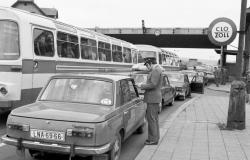Günter Verheugen will be eighty this week and his memory is still working fine. Therefore, without hesitation, he reaches back to the events and actors from 20 years ago, when he was European Commissioner for Enlargement. It was he who got the Czech Republic back into Europe in 2004. In an interview with Aktuálně.cz, he mentions the key moments of the Czech path to the union and finally asks an unexpected question himself.
20 years ago, you were there when the EU expanded to include ten new countries. Sudeten Germans protested against the entry of the Czech Republic for a long time due to the existence of the Beneš decrees. How serious an obstacle was it on the Czech path to the EU?
It was a serious problem. Not for the commission because it was not an issue in terms of European law. But politically it looked dangerous. Conservatives from Bavaria and Austria managed to organize support against the Czech Republic in the European Parliament and demanded that you have to label Beneš’s decrees as illegal and unjust, otherwise you cannot join the union. Descendants of Germans expelled in 1945 asked for the return of their property and compensation and had a stand in their countries.
How did you deal with it as enlargement commissioner?
I have repeatedly spoken to the heads of individual factions in the European Parliament and warned them. I told them that the decrees had a legal basis in the Potsdam Agreement and that we would be opening Pandora’s box if we included the 1945 border agreement in Europe in the enlargement negotiations.
The discussion continued for some time, but in the end only a handful of people voted against the entry of the Czech Republic in the European Parliament. You yourself called the decrees of President Beneš obsolete. Bavarian Prime Minister Edmund Stoiber was not satisfied at the time and said that after accession he would put the decrees on the EU agenda and “Czechs will have to listen”. Nothing happened. I am very happy that a by-product of the accession negotiations is that we have been able to get rid of this issue.
Czech politicians continued to work on the topic of decrees for several years after accession. In 2009, Václav Klaus conditioned his signature on the Treaty of Lisbon with a declaration on the inviolability of the Beneš decrees. What are your memories of Klaus?
He was very hard and stubborn. He considered the European Union too open, a big problem for national sovereignty. Our meetings were always relatively short and cold.
What memories do you have of Miloš Zeman or Vladimír Špidla, prime ministers with whom you dealt with as Commissioner for Enlargement?
Much better either way. Miloš Zeman – and I know that he was later questioned and criticized in your country – really did a lot to get the Czech Republic into the EU.
What exactly? Even Miloš Zeman played with the Czechs’ fear that the descendants of the Sudeten Germans would deprive them of their property, it helped him win the 2013 presidential election.
Miloš Zeman could also be stubborn. But as the leader of the opposition, he stood up for the Czech-German declaration in 1997, and then as prime minister he made a very important gesture towards Austria. It was an agreement from Melk about Temelín. The Austrians claimed it was a dangerous power plant, they didn’t want to let you into the union with it. With the Melk agreement signed by Miloš Zeman, Austria gained unique access to information about the power plant and a cooperation system. You didn’t have to do that, it was and is your full right to use nuclear energy. At one point, the German Minister of the Environment spoke up and called Temelín “a pile of rubble”. That’s when I got really nervous that the whole job was going to collapse.
- German politician, member of the German Social Democracy and former European Commissioner.
- He made his mark in the public consciousness the most as European Commissioner for Enlargement (1999 to 2004). He is the father of the idea of joining ten countries at once, he often traveled to these countries and paid for a political celebrity in them. He then served as Commissioner for Industry.
- Miloš Zeman awarded him the Order of the White Lion in 2016 for his help in the Czech accession to the EU. Verheugen lives near Potsdam and lectures and writes about European integration.
Why should she?
Because it could become a new cross-border conflict that would threaten enlargement. I called German Chancellor Gerhard Schröder, my party boss, and told him that this was unacceptable, that he had to stop it. He did it.
In 2004, in addition to the Czech Republic, nine other countries joined the European Union at the same time. You are the author of the idea for this great extension. What led you to it?
When I joined the European Commission in 1999, the principle was that each country would join when it was ready. That was very stupid. Twelve countries stood behind the EU’s doors, and it would burden the Union for many years to come if it were to expand by a few states every other year.
There would be all ten rookies from 2004 (Bulgaria and Romania joined in 2007) in the EU today, if the union had not expanded at once?
Hard to say what would, when would. I defended that it does not make sense to separate the candidate countries, so that Estonia would enter, but not neighboring Latvia. Or the Czech Republic yes and Slovakia no. I said that we should try to organize the enlargement so that all the new states take part in the elections to the European Parliament in June 2004. The accession date then had to be a little earlier. When I first said it, almost no one believed it would work. My good friend, the Swedish Foreign Minister Anna Lindhová, said to me at the time: Günther, I like you, but you are crazy.
Some politicians from Western Europe sometimes say that the enlargement of the EU to include post-communist countries was premature. That we have not enjoyed our sovereignty enough and the result is the struggle for a national veto in the V4 countries and elsewhere. What is your opinion?
I know these German and other voices. They annoy me. They are often said by the same people who criticized me twenty years ago for being too slow as enlargement commissioner. I don’t take it seriously. Do you think the situation in Central Europe would be more stable without the union? That the economy would be stronger? Definitely not. Elections do not always bring a satisfactory result. In 2004, Hungary was everyone’s darling. The Iron Curtain got the first hole there, that’s why everyone admired Hungary and already wanted to have it among them. Who could have guessed in 2004 how the country and its leadership would develop? However, the problem of nationalism and excessive emphasis on sovereign rights is not a phenomenon that is specific only to the new member states. Look at Austria or Italy.
Former European Commissioner Günter Verheugen | Photo: Jakub Plíhal
In recent years, Hungarian Prime Minister Viktor Orbán has been blocking EU decisions wherever possible. Will it be necessary to change the rules so that one leader does not hold others hostage?
Viktor Orbán will end soon and then we will have someone else. This is inevitable in our system. There are only a very limited number of questions where unanimity applies, but I think it’s for the good of the cause. It is a kind of protection. You can’t imagine how quickly support for European integration would disappear in Germany or the Netherlands if there was no unanimity on the European budget and the majority of poorer EU countries decided how much Germans and others had to pay. Perhaps we could use a rule that has been used in international relations, namely that the consensus is all minus one. It would be helpful in the long run, I think.
Do you support EU enlargement to include Ukraine? In an interview with the German newspaper Frankfurter Allgemeine Zeitung, you said that Ukraine received a “political discount” for rapprochement with the Union. What exactly did you mean?
Both decisions, i.e. granting the status of a candidate country and the decision to start negotiations, are purely symbolic in the case of Ukraine. It’s completely against the rules.
Against what rules?
Against the rules of accepting new members. There are criteria enshrined in the contract that must be met. In the case of Ukraine, I have doubts about democracy and the rule of law. About endemic corruption, about oligarchs who have not only economic but also media and political power. And then, the country is at war and it’s going to cost a lot of money to rebuild it. Do we have it?
Ukraine will not join the EU tomorrow. Do you not agree that Europe’s geopolitics and security interests should take precedence over the procedural rules of the Union?
You can do that, but then European integration will be destroyed. The internal market would collapse if Ukrainian goods entered it unchecked. What you can do is create a kind of plus association. I have nothing against it.
Do you think she should not be a full member?
I am for its entry, otherwise the free continent will not be complete. But extension is a legal process for good reasons. Making it a purely political process, giving Ukraine that political concession, is risky. For us.
We started with the Czech Republic, let’s finish with them. What do you think we Czechs have given to the EU?
I once said that the Czechs are world champions in skepticism. You are skeptical in every way. You are a nation with certain experiences, you have reasons not to trust everyone and everything right away. I personally like that. And what did you bring? You are a stable and effective member. I think it’s enough if you look around you.
Do you know Andrej Babiš?
No I do not know that. I’ve never heard of him.
Really? He is a former and possibly future Czech prime minister, a businessman.
Wait, didn’t he have a scandal?
He had a conflict of interest problem.
Yes, this is it. A very rich man, right?
Yes, in Germany he owns a bakery, a fertilizer factory, and chemical plants.
I’ve never met him and I don’t read about him in the newspapers here in Germany either. But now I have a question: What is Miloš Zeman doing? Is he still that sick?
He’s in a wheelchair, but he’s working. Now he has a new book published, he also maintains an office in Prague.
And is he still drinking?
They say not anymore. Do you remember him drinking?
He drank a lot. I have seen him drunk many times. He often offered me a becherovka at the end of our meeting, which, by the way, I never liked. But he was not the only one among the high politicians who drank.
Why do you ask that?
I should go to the Czech Republic in the foreseeable future and I would like to visit Miloš Zeman. So therefore.
Video: I convinced pate manufacturers to pay for the celebrations of the entry into the union, recalls a witness (April 18, 2024)
20 years in the EU – Petra Mašínová | Video: Team Spotlight
Tags: German Czech Republic Klaus stubborn Zeman saved trouble
-





